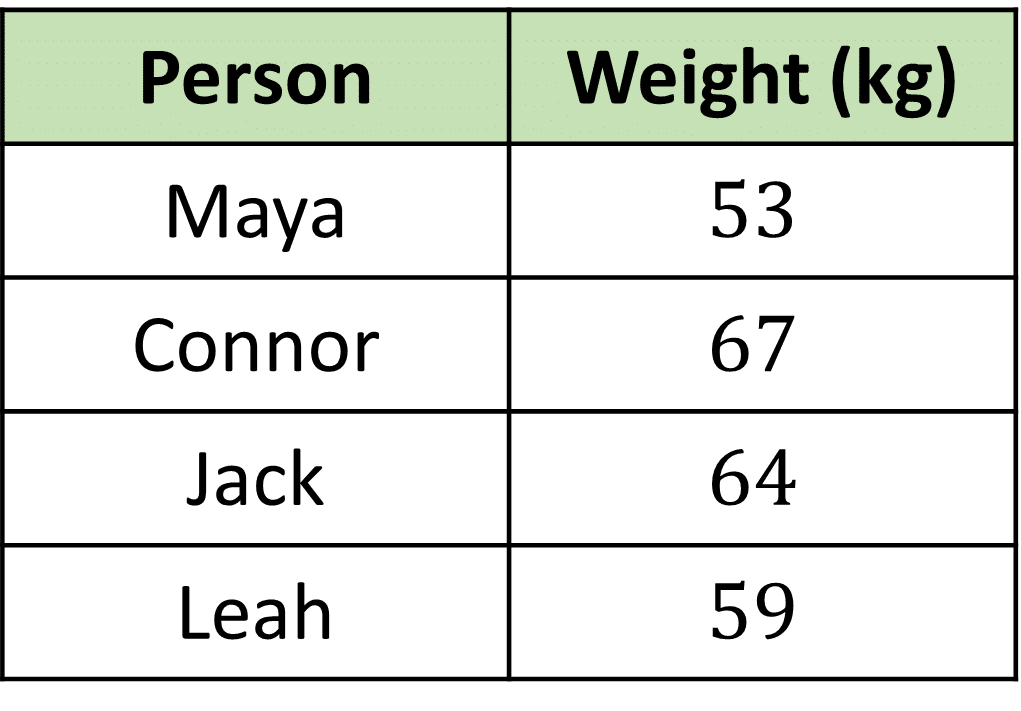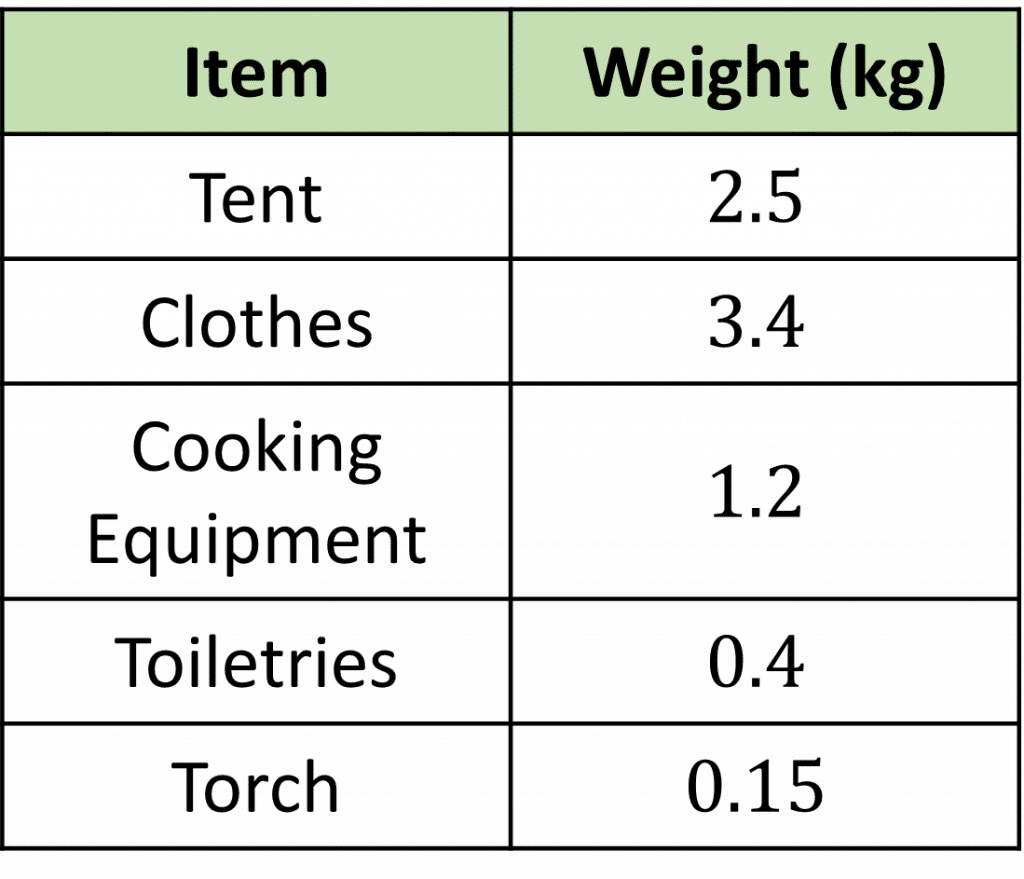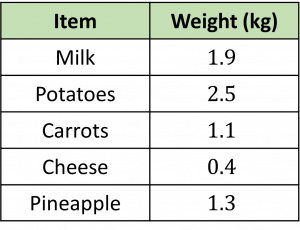Functional Skills: Weight
Weight
The weight of an object is how heavy it is.
Units of Weight
The most used units for weight are grams (g) and kilograms (kg).
There are 1000 grams in a kilogram.
So to convert between grams and kilograms, you multiply/divide by 1000.
Follow Our Socials
Our Facebook page can put you in touch with other students of your course for revision and community support. Alternatively, you can find us on Instagram or TikTok where we're always sharing revision tips for all our courses.
Comparing Weights
In questions or real life you may need to compare objects in terms of weight i.e. which object is the heaviest or lightest.


Example: Abigail, Owen and Elizabeth are all in a lift, their total weight is 192 kg. The maximum weight of the lift is 250 kg. 4 more people are waiting to get into the lift, with their weights shown in the table on the right.
Which person should they let into the lift, to ensure that the maximum weight of the lift is not exceeded?
Subtracting 192 kg from 250 kg gives us 58 kg.
So the additional person must be 58 kg or less.
Only Maya is 58 kg or less, so she should be allowed to go into the lift.
Note:
Weight can also be measured in stone (st), pounds (lbs) and ounces (oz).
An example of these units being used is when measuring someone’s weight e.g. a person might weigh 9 stone 8 pounds.
Example 1: Weight Calculations
Pedro is packing his shopping up at the supermarket. Each plastic bag can only carry \boldsymbol{4} kg.
Here is a list of the items he has bought and their corresponding weights:
- Lemonade – 2 kg
- Bottled water – 2.5 kg
- Eggs – 600 g
- Bread – 350 g
- Potatoes – 3 kg
Work out how many plastic bags Pedro will need.
[3 marks]
First, we need to convert the weight of eggs and bread to kilograms:
Eggs – 600 g =\boldsymbol{0.6} kg
Bread – 350 g =\boldsymbol{0.35} kg
Then add up all of the weights of the items:
2+2.5+0.6+0.35+3=\boldsymbol{8.45} kg
So, we can see that the number of plastic bags Pedro needs is \boldsymbol{3}.
2 bags wouldn’t be enough as this would mean Pedro would only be able to carry 8 kg of shopping.
Example 2: Weight Calculations


Hazel is packing her rucksack for a camping trip she is going on.
The table to the right shows the items she is taking.
Calculate the weight of the rucksack when it is full.
Adding up the weights of the items:
2.5+3.4+1.2+0.4+0.15=7.65 kg
So the full rucksack weighs \boldsymbol{7.65} kg.
Functional Skills: Weight Example Questions
Question 1: Add up the following weights:
316 g, 653 g, 95 g, 249 g
Give your answer in kilograms.
[2 marks]
316+653+95+249=1313 g
Converting this to kilograms:
1313 g =1313\div1000=1.313 kg
Question 2: Daniel wants to buy exactly 8 kg of flour. The flour comes in 3 different sized bags: 500 g, 1 kg and 2.5 kg. What is the smallest number of bags Daniel can buy?
[2 marks]
7.5+0.5=8
So the minimum number of bags is 4
This would be three 2.5 kg bags and one 500 g bag.
Question 3: Molly has a 4 kg bag of soil. She is going plant as many plants as possible, with each plant needing 250 g of soil. Calculate how many she can plant.
[2 marks]
Convert 4 kg into grams:
4 kg =4\times1000=4000 grams
4000\div250=16 plants
Question 4: The recommended maximum weight of a plastic bag at a supermarket is 18 kg.
Ella already has items in her bag that have a total weight of 16.2 kg.
Which of the items in the table below would not be able to go into the plastic bag to keep it under the maximum recommended weight?
[2 marks]
To find out the maximum weight of the final item we need to subtract 16.2 kg from 18 kg.
18-16.2=1.8
So the maximum weight of the additional item is 1.8 kg.
Milk and potatoes are both greater than 1.8 kg (1.9 kg and 2.5 kg respectively), so these cannot go in the plastic bag.
Question 5: Jacob is baking 4 birthday cakes and needs 1.6 kg of flour. He finds 3 different bags of flour in his cupboard.
Bag 1 has 600 g of flour in
Bag 2 has 0.7 kg of flour in
Bag 3 has 350 g of flour in
Does Jacob have enough flour to make the 4 cakes?
[2 marks]
First we need to convert 1.6 kilograms into grams:
1.6 kg =1600 g
Then convert 0.7 kg into grams:
0.7 kg =700 g
Finally, add up the total amount of flour:
600 g +\,700 g +\,350 g =1650 g
So Jacob does have enough flour.
Specification Points Covered
EL3.14 – Use and compare measures of length, capacity, weight and temperature using metric or imperial units to the nearest labelled or unlabelled division
EL3.16 – Compare measures of weight including grams and kilograms
L1.20 – Convert between units of length, weight, capacity, money and time, in the same system








